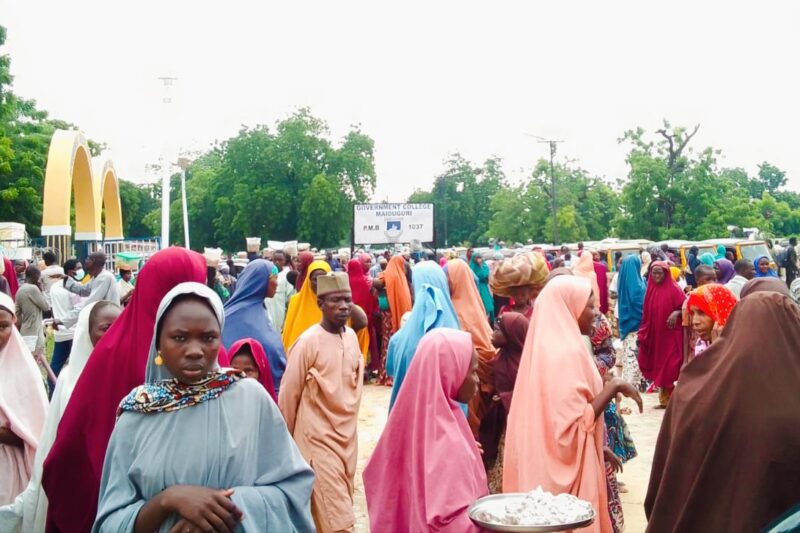Flood victims – mostly women and children – are left stranded on the streets with no place to go after soldiers and security operatives tell them to leave ‘protective’ camps immediately.
The Borno State government has begun shutting down camps set up in Maiduguri and surrounding areas to accommodate hundreds of thousands of people displaced by last week’s devastating flood.
All camps – excluding Gubio, Bakassi and Teachers’ Village which will remain open for another week or two – will be closed by Thursday, September 19.
Those who do not have anywhere else to go have been told to relocate to the remaining camps – for as long as they stay open.
At least two million people were affected by the flood which began in the early hours of Tuesday, September 10, when the Alau Dam began to overflow. More than 400,000 people were displaced, most of whom took refuge in the “protective” camps.
Registered occupants in the camps were given relief materials, including a 25kg bag of rice, a carton of pasta and ₦10,000 cash in the form of tokens and cards.
However, Borno State governor Babagana Umara Zulum announced on Sunday, September 15, that the camps would be shut down “in a week or two”.
The government is conducting mapping and assessment of the flooded areas to guide relocation plans for displaced persons when the three remaining camps are shut down.
On Wednesday, September 18, large groups – mainly women and children displaced by the flood who had been taking refuge in government-run school facilities – were seen stranded along major streets in Maiduguri.
They said they did not know where to go after government officials and men in security uniforms told them vacate camps immediately.
The evicted IDPs were told by officials to seek shelter on their own or in any of the three remaining camps before they, too, are closed in a week or two.
Stranded women told RNI that the three camps were already full to capacity.
Hajja Ya’ana was taking refuge at the Asheikh Jarma Mega Primary School in Maiduguri after her home was submerged.
Now stranded on the Maiduguri-Kano road with her three children, Ya’ana told RNI that officials had told her to leave Asheikh. She said she did not know what to do. She could not return home because her house was still flooded.
“Our house was completely submerged and destroyed by the devastating flood in the Bulabulin area. Floodwater has still not started to recede in the area.
“The state government asked us to leave the camp and relocate to either Bakassi or Teachers’ Village camps. But they are full. We are begging the government to fast-track reconstruction and rehabilitation of our destroyed houses. Life in the camps is extremely difficult. We need to be in our houses.”
Ya’ana said the remaining camps were already full to capacityand could not even accommodate all the people taking refuge there.
“The camps are congested. There is not enough space for the people already staying there. There is not enough food, clean water or shelters. It is not possible for more people to take refuge there.
“We contacted our relatives in those camps and they confirmed that many people who are supposed to be staying there are now sleeping outside the camp because there is no more space. They do not even have enough toilet and sanitary facilities. So, now we are asking, where are we supposed to go?”
Ya Maryam was told to leave the camp at the Yerwa Government Girls Secondary School in Maiduguri.
“Most of us are now stranded. We are standing on the roadside with our belongings. We don’t know where to go or what to do. There were about 20,000 displaced flood victims staying in Yerwa. Now we are out on the streets of Maiduguri.
“Government officials asked us the leave the camp and relocate to Gubio, Bakassi or Teachers’ Village. Even if they were not already full, many of us are afraid to go to those camps because we do not have tokens or cards, which confirm that we are flood victims.
“Right now, I don’t know where to go because my house in the Gamboru area was completely destroyed. What is left of the house is still under water. We are in a desperate situation. We are begging the government to help us by providing shelters.”
Soldiers and security operatives told Fatima Mohammed and other flood victims to leave the temporary camp at Yerwa.
Security personnel told Fatima that the school authorities needed to access the camp to prepare for the resumption of classes which they hoped would begin next week.
“Many victims – mostly women and children – are now stranded. We do not know where to go. My house in the Gangamari area is still under water. Even though I would love to return home, I can’t.
“None of us wants to stay in displaced persons’ camps. We all want to go home. We were taking refuge in the camps only because our houses are flooded and we were forced to leave for safety reasons.
“We are begging the government to consider our plight at this difficult time. If the flood had not happened, we would not be in this disastrous situation. What did we do to deserve this calamity? Where are we supposed to go? How will we survive?”
In his second statewide address on Sunday, Zulum was adamant that all temporary camps established to house displaced flood victims would be closed “in a week or two”.
“The era of running IDP camps in the state capital is over,” he said.
SHETTIMA LAWAN MONGUNO








